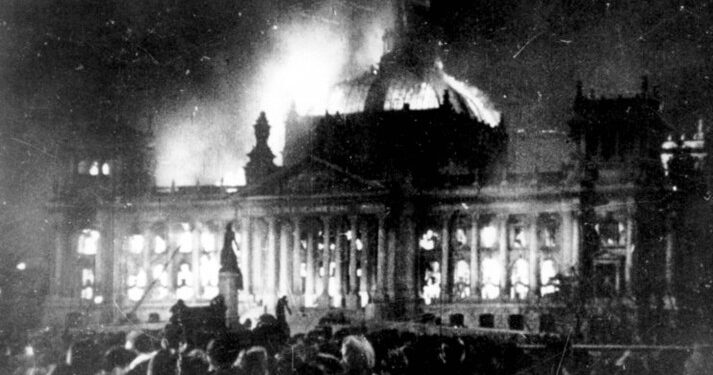On the night of February 27, 1933, flames illuminated the Berlin sky as the German parliament building, the Reichstag, burned in a devastating fire. This event, occurring just four weeks after Adolf Hitler had been appointed Chancellor of Germany, would prove to be a critical turning point in the consolidation of Nazi power and the dismantling of German democracy.
The fire was discovered shortly after 9:00 PM, and despite firefighters’ efforts, the main chamber of the parliament was destroyed. Police arrested a young Dutch communist named Marinus van der Lubbe at the scene. Van der Lubbe, a former communist who had entered Germany recently, was found inside the building with fire-starting materials in his possession. He confessed to starting the fire alone as a protest action.
However, the timing of the fire proved remarkably convenient for the Nazi leadership. Hitler and his propaganda minister Joseph Goebbels immediately framed the fire as part of a larger communist plot to overthrow the government, despite limited evidence supporting this claim. Van der Lubbe was eventually tried, convicted, and executed for the crime.
The day after the fire, President Paul von Hindenburg, at Hitler’s urging, signed the Reichstag Fire Decree, which suspended most civil liberties in Germany, including freedom of speech, assembly, and press. The decree also abolished the privacy of communications and restricted property rights. This emergency legislation remained in effect throughout the entire Nazi period, providing a legal foundation for much of the regime’s subsequent repression.
Just weeks later, on March 23, the German parliament passed the Enabling Act, which effectively granted Hitler dictatorial powers. The communist deputies had already been arrested following the fire, and the Nazi intimidation tactics ensured passage of this legislation that marked the end of the Weimar Republic’s democratic government.
The question of who actually set the Reichstag fire remains contested by historians. While some maintain that van der Lubbe acted alone, others argue the Nazis orchestrated the arson as a false flag operation to accelerate their seizure of power. Regardless of its origins, the fire’s consequences were unmistakable: it provided Hitler with the pretext needed to establish emergency powers, silence opposition, and rapidly transform Germany from a democracy into a totalitarian state under Nazi control.
newshub




Recent Comments